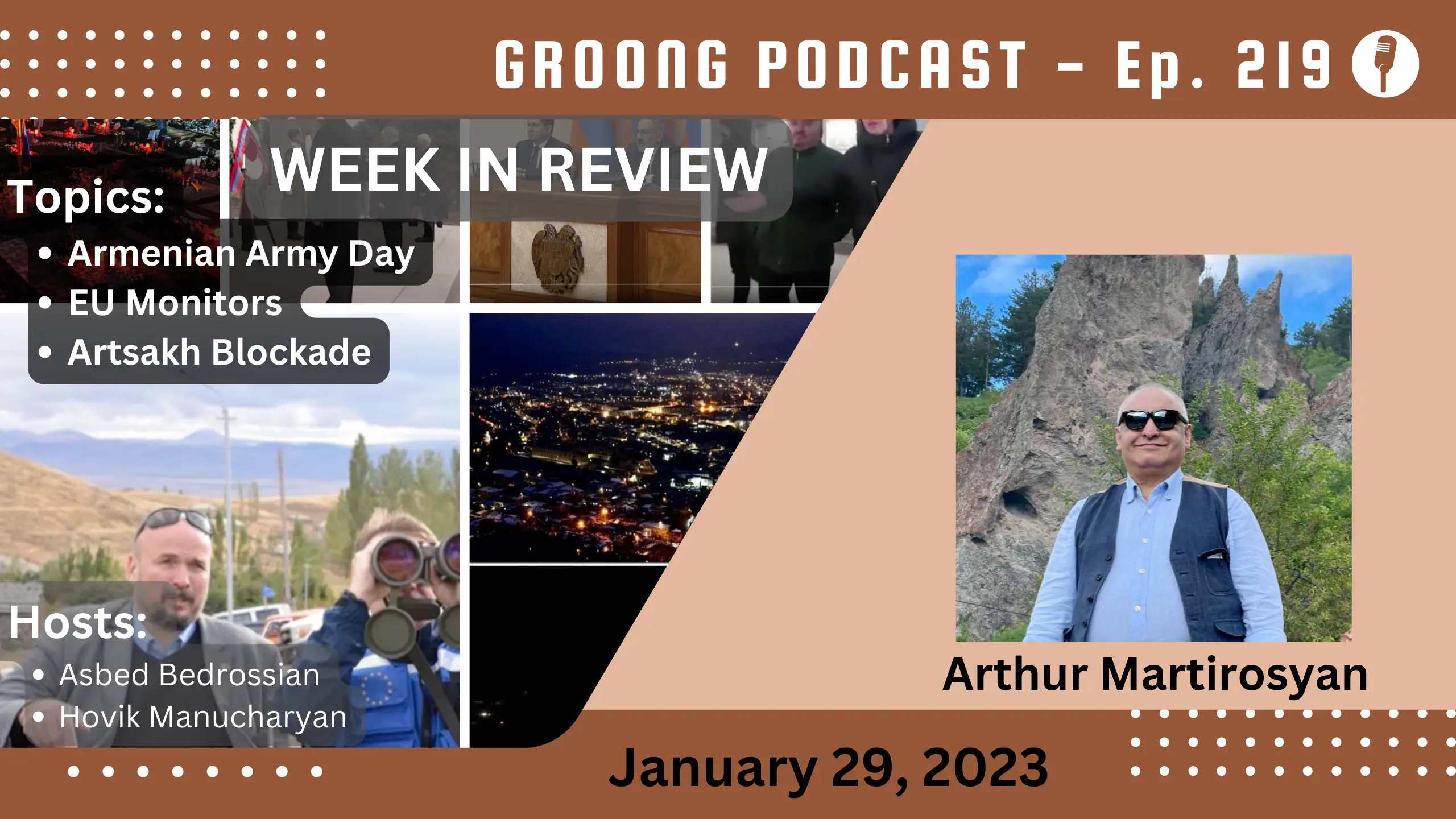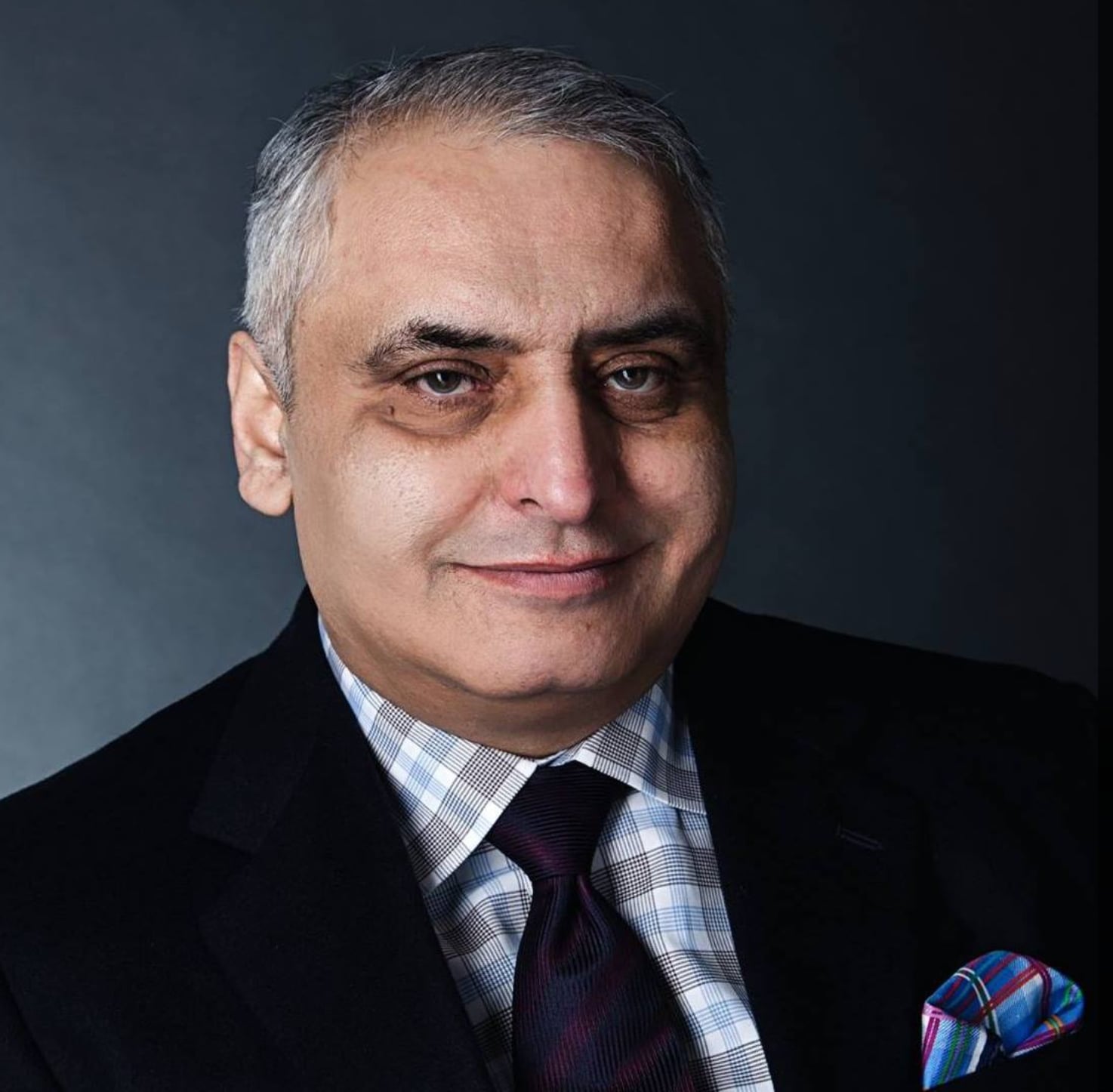
Guest:
Topics:
- Army Day - January 28
- Events at Yerablur
- New EU Monitoring Mission
- Armenia’s Diplomacy
- Russia’s Increasing Displeasure
- Iran’s Tempered Displeasure
- Artsakh Blockade
Episode 219 | Recorded: January 29, 2023
Show Notes
Armenian Army Day
January 28 - Army Day
Armenia’s Army Day is on January 28, that was yesterday. First we’d like to thank all those who’ve served, who are serving, and plan to serve, on this important milestone, the 31st anniversary of the Armenian army. Thank you!
The Armenian armed forces are the backbone of the hopes of any successful Armenian state. Let’s just be blunt: there is no future without a strong army.
Events of the Day
Yesterday hundreds of parents and relatives of fallen soldiers were forcibly removed from Yerablur, by hundreds, by some accounts thousands, of Pashinyan’s red beret police and other guards. This was to secure Pashinyan and some of his ministers to visit the Pantheon of fallen soldiers on Army Day.
As a background note, let me add that there was absolutely zero coverage of these events in government controlled press, such as Armenpress. There were many articles in the more independent or opposition-leaning press, like 168.am..
Question:
- Impressions from the day?
Background notes:
- 3rd January 28 that is in mournful mood:
- January 2021 - Right after the war.
- January 2022 - Ceremony canceled because of “Covid”
- January 2023 - Memory of 15 dead soldiers
- Pashinyan’s speeches on 1/28:
- «Մենք չպետք է շեղվենք այդ օրակարգից և պետք է հետևողականորեն առաջ մղենք խաղաղության օրակարգը»
- «We cannot deviate from that agenda and need to consistently push forth the agenda of “peace”»
- Sasun Mikaeliyan, one of the Civil Contract members and head of the Yerkrapah organization said that after Vazgen Sargsyan, we have not had any army building.
Azat incident: No Political Accountability
In the aftermath of the horrible fire in the military barrack in Gegharkunik, people are feeling demoralized and are full of apprehension towards the government and how it is treating the armed forces.
It’s been additionally demoralizing to know that the government has written off the possibility of any political accountability for this incident by Pashinyan’s government. Meanwhile Pashinyan has been pushing for an incident narrative that he himself conceived of, before any investigation was even launched.
The government made an arrest this week. A deputy commander of “the base” who was in charge of supplies and accommodations was charged with failing to provide fire safety equipment.
So far there is every indication that the government plans on railroading its own narrative on this horrible accident, and shovel everything under the rug.
Question:
- What are your thoughts about this terrible event, 10 days after the death of 15 soldiers?
New EU Monitoring Mission
On Monday, the EU approved an expanded, civilian monitoring mission to the borders of Armenia. The mission was originally for 200 monitors and for 2 years, but that was reduced to 100 monitors at least for now.
We should note that these monitors are sent to Armenia, near the current line of contact between Armenia and Azerbaijan. As Azerbaijan has invaded sovereign Armenian territory, yet they also claim that none of their forces are on what they consider Armenian territory, and they have not approved of the EU monitors to be on the de-facto or de-jure borders between the countries.
The Armenian government has decided to station the EU monitors along the entire length of the Armenian-Azerbaijani border (including Nakhijevan).
What is Armenia doing?
The Armenian government has received the news very enthusiastically. Foreign Minister Mirzoyan said that the mission will contribute to peace and stability in the region.
Since May 2021, Armenia has asked CSTO to give a declaration on Azerbaijani behavior, but the CSTO has refused to get involved. The offer of sending CSTO monitors to Armenia was rejected by Armenia based on the grounds that the CSTO would not identify Azerbaijan as an aggressor country. Some individual EU countries on the other hand (e.g. France) have called Azerbaijan an aggressor.
Questions:
- Are the official grounds for rejecting the CSTO monitors legitimate, or sufficient reason for the political row between Armenia and the CSTO?
- So what if France has called Azerbaijan an aggressor? Outside of a statement, or declaration, what difference does it make on the ground?
- Thinking of some scenarios, suppose Azerbaijan attacks, what will the unarmed EU monitors do? Could this help expedite EU sanctions? Would sanctions even mean anything for Azerbaijan?
- What advantages do you see for Armenia, political or otherwise, in accepting the EU mission, over the CSTO mission?
- Will 100 unarmed, civilian monitors along 1,000 kms of border give the EU any sort of advantage in the region?
What is the EU doing?
Various EU leaders, including the leader of the French National Assembly recently said that the EU cannot provide a security umbrella to Armenia.
Questions:
- But if this monitoring mission carries the risk of alienating Armenia’s strategic ally Russia, one who has an agreement with Armenia and actually has boots on the ground and is nuclear armed, then are the Armenian authorities thinking clearly about their next steps?
- Is it possible that Armenia could end up in a situation in which it gets the worst of both worlds, no nuclear umbrella, no Russian base, and no external power (other than Turkey) which would be willing to commit forces to Armenia?
Russia’s Increasing Displeasure
The Russian side has been vehemently, unequivocally negative about this mission. The latest statement came from the Russian MFA who quoted Zakharova:
_“The EU’s attempts to gain a foothold in Armenia at any cost and sideline Russia’s mediation efforts may hurt the interests of people in Armenia & Azerbaijan in their pursuit of peaceful development. Russian peacekeepers remain a key factor of regional stability.”_
Questions:
- The language is still diplomatic, but clearly Russia doesn’t like it. Why is Russia furious about this move? What do they stand to lose?
- How would you decipher the statement above, specifically the mention of Peace Keepers? Do you think that Russia is signaling that they may withdraw their PKs from Artsakh as punishment? (which has been rumored)
- We know there are Russian peacekeepers or border guards already deployed in some areas of the Armenia-Azerbaijan eastern border. Is there a potential for conflict between the unarmed monitors and the Russian border guards (not the PKs).
Iran’s Tempered Displeasure
Iran has also in the past put out veiled statements about foreign forces in the region, but it has been less confrontational than Russia.
Questions:
- However, as the EU is again imposing sanctions on Iran as well, could Iran’s stance begin shifting about the presence of EU monitors?
- What are the reasons why Iran is opposed to western monitors in Armenia?
Artsakh Blockade
OK, here we are on the 49th day of the blockade, and it looks like it may take a long time. Last weekend we saw Ruben Vardanyan’s interview on BBC Hardtalk, and he was clear as a whistle: nobody’s giving up, nobody’s going anywhere, he and the Armenians of Artsakh are at home.
Question:
- What should Armenia and Armenians do to weather the storm?
On Wednesday, Pashinyan warned Artsakh’s leadership again - we’re assuming the target was Ruben Vardanyan - that they should not undermine his “agenda of peace”. Of course, Pashinyan’s peace is selling the Armenians of Artsakh down the river, with very questionable and temporary expectations in return.
Questions:
- What is Artsakh’s government doing, or saying, that is causing Pashinyan concern?
- What could be said, or done, and with what consequences?
Topics from the Panelists
- Arthur - Concern and actions towards the safety of Artsakh Armenians
- Hovik - Fight apathy towards the plight of Artsakh
Wrap-up
We hope you found our Week in Review helpful. We invite your feedback and your suggestions. You can find us on most social media and podcast platforms. Thanks to Laura Osborn for the music on our podcasts.
Guests

Arthur G. Martirosyan
Arthur G. Martirosyan is a Senior Consultant with CM Partners. In 1994, after graduating from Yale University, he joined Conflict Management Group and Harvard Negotiation Project, and has since worked on conflicts in the former Soviet Union, the Middle East, the Balkans, Africa, and Latin America.
Hosts

Hovik Manucharyan
Hovik Manucharyan is an information security engineer who moved from Seattle to Armenia in 2022. He co-founded the ANN/Groong podcast in 2020 and has been a contributor to Groong News since the late 1990s.
Disclaimer: The views expressed by Hovik Manucharyan on the ANN/Groong podcast are his own and do not necessarily reflect the opinions of his employer or any other organization.

Asbed Bedrossian
Asbed Bedrossian is an IT professional, and for years oversaw the central IT enterprise infrastructure and services at USC. His decades of experience spanned across IT strategy, enterprise architecture, infrastructure, cybersecurity, enterprise applications, data center operations, high performance computing, ITSM, ITPM, and more.
Asbed founded the Armenian News Network Groong circa 1989/1990, and co-founded the ANN/Groong podcast in 2020.